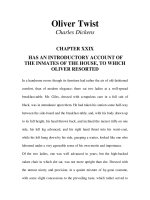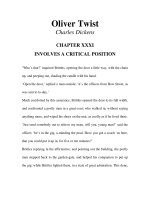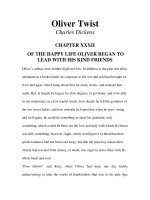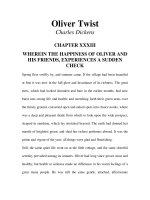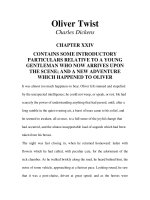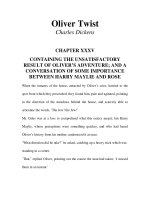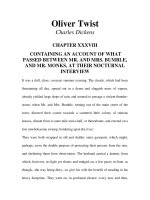Tài liệu LUYỆN ĐỌC TIẾNG ANH QUA TÁC PHẨM VĂN HỌC-SHORT STORY BY O’HENRY- The Princess And The Puma docx
Bạn đang xem bản rút gọn của tài liệu. Xem và tải ngay bản đầy đủ của tài liệu tại đây (26.44 KB, 10 trang )
SHORT STORY BY O’HENRY
The Princess And The Puma
There had to be a king and queen, of course. The king was a terrible old man
who wore six-shooters and spurs, and shouted in such a tremendous voice
that the rattlers on the prairie would run into their holes under the prickly
pear. Before there was a royal family they called the man "Whispering Ben."
When he came to own 50,000 acres of land and more cattle than he could
count, they called him O'Donnell "the Cattle King."
The queen had been a Mexican girl from Laredo. She made a good, mild,
Colorado-claro wife, and even succeeded in teaching Ben to modify his
voice sufficiently while in the house to keep the dishes from being broken.
When Ben got to be king she would sit on the gallery of Espinosa Ranch and
weave rush mats. When wealth became so irresistible and oppressive that
upholstered chairs and a centre table were brought down from San Antone in
the wagons, she bowed her smooth, dark head, and shared the fate of the
Danae.
To avoid lese-majeste you have been presented first to the king and queen.
They do not enter the story, which might be called "The Chronicle of the
Princess, the Happy Thought, and the Lion that Bungled his Job."
Josefa O'Donnell was the surviving daughter, the princess. From her mother
she inherited warmth of nature and a dusky, semi-tropic beauty. From Ben
O'Donnell the royal she acquired a store of intrepidity, common sense, and
the faculty of ruling. The combination was one worth going miles to see.
Josefa while riding her pony at a gallop could put five out of six bullets
through a tomato-can swinging at the end of a string. She could play for
hours with a white kitten she owned, dressing it in all manner of absurd
clothes. Scorning a pencil, she could tell you out of her head what 1545 two-
year-olds would bring on the hoof, at $8.50 per head. Roughly speaking, the
Espinosa Ranch is forty miles long and thirty broad--but mostly leased land.
Josefa, on her pony, had prospected over every mile of it. Every cow-
puncher on the range knew her by sight and was a loyal vassal. Ripley
Givens, foreman of one of the Espinosa outfits, saw her one day, and made
up his mind to form a royal matrimonial alliance. Presumptuous? No. In
those days in the Nueces country a man was a man. And, after all, the title of
cattle king does not presuppose blood royalty. Often it only signifies that its
owner wears the crown in token of his magnificent qualities in the art of
cattle stealing.
One day Ripley Givens rode over to the Double Elm Ranch to inquire about
a bunch of strayed yearlings. He was late in setting out on his return trip, and
it was sundown when he struck the White Horse Crossing of the Nueces.
From there to his own camp it was sixteen miles. To the Espinosa ranch it
was twelve. Givens was tired. He decided to pass the night at the Crossing.
There was a fine water hole in the river-bed. The banks were thickly covered
with great trees, undergrown with brush. Back from the water hole fifty
yards was a stretch of curly mesquite grass--supper for his horse and bed for
himself. Givens staked his horse, and spread out his saddle blankets to dry.
He sat down with his back against a tree and rolled a cigarette. From
somewhere in the dense timber along the river came a sudden, rageful,
shivering wail. The pony danced at the end of his rope and blew a whistling
snort of comprehending fear. Givens puffed at his cigarette, but he reached
leisurely for his pistol-belt, which lay on the grass, and twirled the cylinder
of his weapon tentatively. A great gar plunged with a loud splash into the
water hole. A little brown rabbit skipped around a bunch of catclaw and sat
twitching his whiskers and looking humorously at Givens. The pony went on
eating grass.
It is well to be reasonably watchful when a Mexican lion sings soprano
along the arroyos at sundown. The burden of his song may be that young
calves and fat lambs are scarce, and that he has a carnivorous desire for your
acquaintance.
In the grass lay an empty fruit can, cast there by some former sojourner.
Givens caught sight of it with a grunt of satisfaction. In his coat pocket tied
behind his saddle was a handful or two of ground coffee. Black coffee and
cigarettes! What ranchero could desire more?
In two minutes he had a little fire going clearly. He started, with his can, for
the water hole. When within fifteen yards of its edge he saw, between the
bushes, a side-saddled pony with down-dropped reins cropping grass a little
distance to his left. Just rising from her hands and knees on the brink of the
water hole was Josefa O'Donnell. She had been drinking water, and she
brushed the sand from the palms of her hands. Ten yards away, to her right,
half concealed by a clump of sacuista, Givens saw the crouching form of the
Mexican lion. His amber eyeballs glared hungrily; six feet from them was
the tip of the tail stretched straight, like a pointer's. His hind-quarters rocked
with the motion of the cat tribe preliminary to leaping.
Givens did what he could. His six-shooter was thirty-five yards away lying
on the grass. He gave a loud yell, and dashed between the lion and the
princess.
The "rucus," as Givens called it afterward, was brief and somewhat
confused. When he arrived on the line of attack he saw a dim streak in the
air, and heard a couple of faint cracks. Then a hundred pounds of Mexican
lion plumped down upon his head and flattened him, with a heavy jar, to the
ground. He remembered calling out: "Let up, now--no fair gouging!" and
then he crawled from under the lion like a worm, with his mouth full of
grass and dirt, and a big lump on the back of his head where it had struck the
root of a water-elm. The lion lay motionless. Givens, feeling aggrieved, and
suspicious of fouls, shook his fist at the lion, and shouted: "I'll rastle you
again for twenty--" and then he got back to himself.
Josefa was standing in her tracks, quietly reloading her silver- mounted .38.
It had not been a difficult shot. The lion's head made an easier mark than a
tomato-can swinging at the end of a string. There was a provoking, teasing,
maddening smile upon her mouth and in her dark eyes. The would-be-
rescuing knight felt the fire of his fiasco burn down to his soul. Here had
been his chance, the chance that he had dreamed of; and Momus, and not
Cupid, had presided over it. The satyrs in the wood were, no doubt, holding
their sides in hilarious, silent laughter. There had been something like
vaudeville--say Signor Givens and his funny knockabout act with the stuffed
lion.
"Is that you, Mr. Givens?" said Josefa, in her deliberate, saccharine
contralto. "You nearly spoilt my shot when you yelled. Did you hurt your
head when you fell?"
"Oh, no," said Givens, quietly; "that didn't hurt." He stooped ignominiously
and dragged his best Stetson hat from under the beast. It was crushed and
wrinkled to a fine comedy effect. Then he knelt down and softly stroked the
fierce, open-jawed head of the dead lion.
"Poor old Bill!" he exclaimed mournfully.
"What's that?" asked Josefa, sharply.
"Of course you didn't know, Miss Josefa," said Givens, with an air of one
allowing magnanimity to triumph over grief. "Nobody can blame you. I tried
to save him, but I couldn't let you know in time."
"Save who?"
"Why, Bill. I've been looking for him all day. You see, he's been our camp
pet for two years. Poor old fellow, he wouldn't have hurt a cottontail rabbit.
It'll break the boys all up when they hear about it. But you couldn't tell, of
course, that Bill was just trying to play with you."
Josefa's black eyes burned steadily upon him. Ripley Givens met the test

